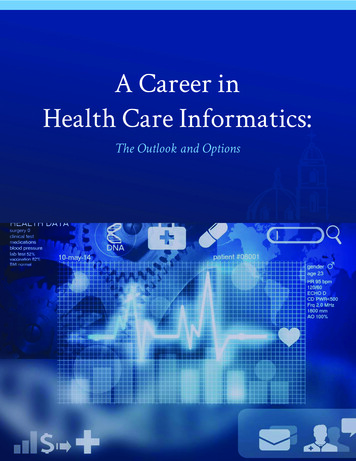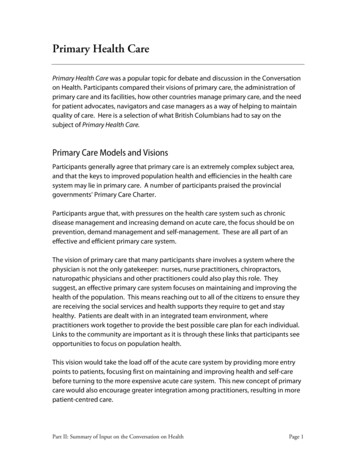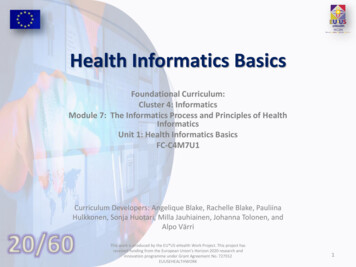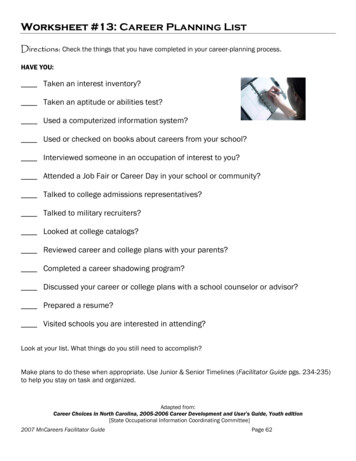
Transcription
A Career inHealth Care Informatics:The Outlook and Options
Table of ContentsA Career in Health Care Informatics:The Outlook and OptionsIntroductionHealth Care Informatics vs. Nursing InformaticsJob Growth and Outlook35Careers in Health Care Informatics612Chief Medical Information Officer (CMIO)14Director of Clinical Information Systems16Data Scientist18Health Informatics Consultant19Professor of Health Informatics21Researcher22Breaking into the Field24
INTRODUCTIONHealth Care Informatics Vs. Nursing InformaticsHealth care informatics has been a distinct discipline forseveral decades now.But it has moved to the forefront over the last five years with health care organizationsmaking the transition to electronic health records (EHRs). Today, the health careinformatics industry is exploding and the Bureau of Labor Statistics predicts that jobs inthe field will “grow much faster than the average for all occupations.”Defined by the U.S. National Library of Medicineas the “interdisciplinary study of the design, development, adoption and application ofIT-based innovations in health care services delivery, management and planning,” healthcare informatics was propelled to popularity with the passage of the Health InformationTechnology for Economic and Clinical Health Act. Under this law, health centers,including hospitals, clinics and private physician offices, were required to create andmaintain electronic medical records for every patient by the year 2015.3
INTRODUCTIONHealth Care Informatics Vs. Nursing InformaticsBy now, the majority of health centers have moved to electronicpatient records, which has created enormous possibilities in thefield of health informatics.This new and extensive digital data set has created unimagined possibilities for health careinformatics professionals to analyze trends, make predictions, monitor outcomes and ingeneral improve patient health, delivery and diagnosis.Dr. Steven Steinhubl, director of digitalmedicine for Scripps Health,told The San Diego Union Tribune that the adoption ofelectronic health records by all of the region’shospitals has opened up possibilities that did not existfive years ago. For example, he noted, it’s now possibleto look for trends across patients in records that usedto be stranded in paper folders.In order to realize the full potential of EHRs and effectively analyze this newly available patientdata, educated and skilled health informatics professionals are needed — and the demand isstrong.This career planning guide will examine the booming field of health informatics and themany career options now available. But first it is important to clearly delineate betweentwo similar and often confused areas of informatics: health care informatics and nursinginformatics.4
INTRODUCTIONHealth Care Informatics Vs. Nursing InformaticsHealth Care Informatics vs. Nursing Informatics– What’s the Difference?Nursing informatics,on the other hand, is a subspecialty ofnursing and falls under the broader healthinformatics umbrella. Nursing informatics deals directly with patient care and isthe “science and practice (that) integratesnursing, its information and knowledge,with management of information andcommunication technologies to promotethe health of people, families andcommunities worldwide,” according to theIMIA Special Interest Group on NursingInformatics. Not surprisingly, nursingHealth care informaticsinformatics is geared toward nurses, whois, at a very basic level, the use of infor-want to improve patient safety throughmation technology to improve patientthe use of computer science, informationcare. It also covers the broad, overarch-technology and nursing science.ing discipline of informatics and dealswith the application of technology to allareas of health care, from education toresearch to administration.5
Job Growth and Outlook forHealth Care Informatics Professionals
SECTION ONEJob Growth and OutlookPrior to the mandate for EHRs, health informationpositions did exist, but the roles looked much differentthan they do today.Jonathan Mack, program coordinator forUniversity of San Diego’s Master of Sciencedegree in Health Care Informatics,was quoted as saying in a San Diego BusinessJournal article,“The skill level for managing the oldsystems was quite low, you didn’t need a coder or aprogrammer. Now, all of a sudden, you have thesecomplex electronic medical records and you have nostaff that can manage them.”Consequently, there has been a surge in job postings for health informaticsprofessionals and the Bureau of Labor Statistics projects that the number ofjobs in the health care informatics field will grow 22% by 2022, twice as fastas employment overall.The problem is, there are currently not enough skilled informatics experts to fill these newpositions, which require candidates to have both medical and information technologyexpertise — a combination that can be extremely hard to find.7
SECTION ONEJob Growth and OutlookAccording to Burning Glass Technologies,“New and emerging health informatics positions stay open twiceas long as the ones they are replacing. Postings for MedicalRecords Clerks, an older position, stay open for 18 days on average,compared to 38 days for its newer successor, Clinical Analyst.”Average posting duration for health informatics positionsMEDICAL RECORDCLERK18 DAYSHEALTH INFORMATIONTECHNICIAN26 DAYSALL MIDDLE SKILL JOBSHealth informatics roles thatare up-skilling or being replacedby higher-skilled roles31 DAYS38 DAYSCLINICAL ANALYSTMEDICAL CODER40 DAYSCLINICAL APPLICATIONDEVELOPER40 DAYSMEDICAL RECORDS &CODING SUPERVISOR41 DAYSHEALTH maticsroles42 DAYS15253545AVERAGE POSTING DURATION (DAYS)BURNING GLASS TECHNOLOGIES, 20148
SECTION ONEJob Growth and OutlookAs a result of this high demand and the shortage ofqualified professionals with the unique combination ofskills required by employers, pay for health informaticsexperts is high.A Healthcare IT News article reported that:Informatics is a top career in healthcare because those who master the art of combiningpatient care with health IT skills are in a better position to demand more pay, expandtheir growth potential and become an integral part of a growing dynamic health organization. “Clinicians with informatics skills are perfectly poised to expand their role athealthcare organizations that have already adopted electronic health records and are nowgetting ready to reap the rewards by analyzing the data from those systems,” said JoyceSensmeier, vice president of informatics at the Healthcare Information and ManagementSystems Society.9
SECTION ONEJob Growth and OutlookAs of 2015, the overall average salary for health IT professionals was 111,387.52, according to an annual compensation survey by theHealthcare Information and Management Systems Society. The averagesalary for IT professionals across all industries was much lower,at 85,460 according to glassdoor.com.Average Salaries for Health IT Professionals by RegionNEW ENGLANDWEST NORTHCENTRAL 102,522 113,493MID ATLANTIC 121,178PACIFIC 127,117EAST NORTHCENTRALMOUNTAIN 103,109 109,959SOUTH ATLANTIC 116,388HEALTHCARE INFORMATION ANDMANAGEMENT SYSTEMS SOCIETY, 2015WEST SOUTHCENTRAL 101,281EAST SOUTHCENTRAL 107,966However, depending upon geographical location and job title, the latterof which is often a reflection of education and experience, salary canbe a lot higher than the average.As reported in Modern Healthcare, Gartner research found that compensation levels for chief medicalinformation officers, who typically possess a medical degree, “ranged from 206,000 to 550,000, with themedian falling in the range of 300,000 to 349,000.”10
SECTION ONEJob Growth and OutlookLooking at just salary alone could explain the high levelsof job satisfaction reported among professionals in the field.According to Health IT Jobs, 80% of respondents in their 2014 salary survey reported beingsatisfied with their jobs. Gartner echoed this sentiment in Modern Healthcare, reporting that“job satisfaction in the field is high, with 44% (of CMIOs polled) indicating that they were verysatisfied with their work, while 43% were somewhat satisfied. Meanwhile, 44% felt theywere very successful and 50% somewhat successful at their jobs.” Flexibility, the ability tolearn new skills and advance one’s career, in addition to income potential, are among theother reasons cited by health informatics professionals for their high career satisfaction.11
Careers in Health Care Informatics
SECTION T WOCareersWith strong demand, great pay and high job satisfaction,it is easy to see why a career in health informatics is soappealing.What’s more, the different avenues within health informatics are many and varied, fromresearch to administration and management to clinical leadership. Plus, there are a numberof organizations beyond just hospitals and clinics that are actively seeking skilled healthinformatics professionals, including medical software companies, consulting firms, medicaldevice and technology companies, medical libraries, research laboratories, universities,government agencies, private practices, pharmaceutical companies and more. Let’s lookmore closely at some of the positions and careers available within the health informaticsfield.13
SECTION T WOCareers: CMIOChief Medical Information Officer (CMIO)Salary: 206,000 to 550,000, with the median falling in the range of 300,000 to 349,000The chief medical information officer (CMIO) is a highly coveted and integral C-suiteposition that was ranked one of the fastest-growing positions in health care, according to theAssociation of Medical Directors of Information Systems. Generally, CMIOs are physicianswho continue to see patients on a part-time basis while spending the other half of theirtime designing and integrating IT systems for medical facilities, analyzing EHRs and othertechnologies being used in medical care, training physicians and creating strategic IT plansfor their organization. Many CMIOs work in acute care settings and report to the chiefinformation officer.14
SECTION T WOCareers: CMIOQualificationsTo become a CMIO you need a high level of education both in medicine and informatics. In asurvey conducted by Gartner, which polled 120 members of the Association of MedicalDirectors of Information Systems, a professional association of physicians in appliedmedical informatics, it was found that “only 18% of the CMIOs surveyed didn’t haveadvanced informatics training.”Vi Shaffer, a vice president at Gartner, said in a Modern Healthcare article referring to thesurvey that “CMIOs are seemingly tireless, highly educated and experienced.” She notedthat 71% still practice medicine and 78% have some previous administrative or managementexperience.Generally, requirements to become a CMIO include: Board certification in particular field of medical specialty Have worked on a clinical information technology project at a hospital ormedical facility Have a strong interest in technology and IT Demonstrate proven leadership skills and experience Have negotiation and conflict resolution skills Show management acumen Have extensive experience in the medical field as a physician Have a degree or training in health informatics15
SECTION T WOCareers: Director of Clinical Information SystemsDirector of Clinical Information Systems(or Clinical IT Leadership Positions)The median annual salary for clinical IS directors is 168,805, as of February 2016,with a range usually between 134,464 and 221,562, according to salary.com.A director of clinical information systems typically manages a team of clinicalinformation systems staff and is charged with designing and implementing newtechnological solutions to improve clinical operations. This role is concerned withsynthesizing data and optimizing information management in order to improve patientcare and community health. This is a leadership role that requires strong IT knowledge,project management and critical thinking skills.16
SECTION T WOCareers: Director of Clinical Information SystemsQualificationsWhile qualifications will vary from employer to employer, these are a few of therequirements that most employers will expect for the Director of Clinical InformationSystems position. Have a minimum of a bachelor’s degree, although a master’s is preferred Management experience in clinical information systems 10 years of leadership experience in a medical setting Experience in both technical and strategic health care roles Experience or education specific to electronic medical records and health informaticsClinical Applications AnalystClinical Applications Analyst is a similar role that would likely report to the Director ofClinical Information Systems. Analysts typically make around 71,000 per year and help tobridge the flow of information between IT systems and people. They assist clinical staff withIT systems, manage patient EHRs and interpret data.17
SECTION T WOCareers: Data ScientistData ScientistMedian salary ranges from 80,000 to 232,500, according to Burtch Works, aU.S.-based executive recruitment agency for quantitative business professionals.Unlocking the full potential of data means transforming health care as we know it. Frompredicting and preventing illness across populations before it begins to allowing doctors toreference data sets to see what worked for similar patients, thereby improving the process offinding new uses for existing drugs, the possibilities are endless. But in order to uncoverthese many possibilities, data scientists are needed.Data scientists merge and analyze data sets from clinical trials, direct observation, EHRs,online patient networks and biomedical research, just to name a few, in order to improvehealth care. Personalized medicine, genomics, predictive analysis, preventive medicine,patient monitoring, disease modeling and mapping, and EHR interoperability are some ofthe areas where data scientists are having a huge impact.Qualifications to work as a data scientist include: Master’s degree, Ph.D. in IT or mathematical related field a plus Strong communication skills Business acumen Natural curiosity Technical computer science skills, such as mastery of Python Coding andHadoop Platform18
SECTION T WOCareers: Health Informatics ConsultantHealth Informatics ConsultantConsultants allow organizations to keep overhead low while still complying with federalrequirements. Today, with health informatics evolving at such a rapid pace, many larger healthcare institutions are reluctant to hire full-time employees because they are unsure of what theirneeds will be in the future. Hiring consultants is a perfect solution for these organizationsand helps them bridge the gap while they determine what their long-term needs will be,what skill sets they will require and how those jobs will be classified. The consultant benefitsfrom the freedom of being able to chose his or her own clients and projects rather than beingtied down to one company. Plus, consultants often receive a higher hourly wage thanfull-time salaried employees.19
SECTION T WOCareers: Health Informatics ConsultantHealth care informatics, as we know it today, is a relatively newfield, and as such a career as a consultant can be an exciting one,helping health care facilities understand and utilize technology toenhance their operations.The job responsibilities for this role can vary depending on the specific needs of theorganization, but consultants generally act as subject matter experts, advising andeducating employees at all levels. In this role you will often be tasked with developingeducational programs and materials, assisting with EHRs, executing data analyses,supporting and consulting with staff, stakeholders and external customers, as well asimproving clinical efficiencies and monitoring overall operations.Qualifications vary greatly for this role butgenerally include: Master’s degree in informatics preferred 5 years in the health care field Demonstrated leadership skills Ability to develop, manage and execute project plans Strong analytical and critical thinking skills IT experience and knowledge Experience analyzing large sets of data and an understanding of cloud technologies20
SECTION T WOCareers: Professor of Health InformaticsProfessor of Health InformaticsSalary: 68,000 is the average pay for health informatics professors, according toSimplyHired.com.Education is another burgeoning career within health informatics. With a shortage ofqualified professionals to fill the many job openings at health facilities across the country,teachers are needed to educate the medical and IT experts who may have an interest ininformatics.Requirements to work as a health informatics professor oreducator typically include: Master’s degree in informatics Doctorate degree a plus Experience in teaching and course development 5 years of experience in the field of health informatics, IT and/or medicine21
SECTION T WOCareers: ResearcherResearcherSalary: Varies greatly depending upon the scope of the research and employer requirementsResearchers in the health informatics field look for new ways to utilize data and technology to improve patient care and delivery. As a researcher you will also be constantlyanalyzing and mining big data in order to identify trends that may affect public health.Additionally, researchers in recent years have been called upon to help deal with themany hiccups that have come with the rapid and sudden growth in health data. This meansworking to improve recruitment for clinical trials, assisting with more effective datacollection and helping to better store, process and analyze data from clinical trials.Researchers often teach at universities and colleges or work part-time as consultantsfor health care organizations.Qualifications to work as a researcher in the informatics field vary according to the type ofresearch required.A report in Science Magazine explained how researcher Vitaly Herasevich used data and acomputer algorithm to develop a “sepsis sniffer,” described as “a computer program thatmonitors a patient’s vital signs and sends out an alert if sepsis, which is an aggressiveimmune reaction to an infection, or other serious trouble is imminent.”The report continued:Herasevich’s sepsis sniffer is a computer algorithmthat taps the critical care unit’s stream of real-timepatient data and, if it detects indications of sepsis orother serious trouble, alerts nurses or physicians viapager, e-mail, or an alert board. The Mayo Clinic isnow studying whether the sniffer decreasesmortality in the hospital’s intensive care unit.“This is an exciting field because you can reallyimpact patient outcomes,” he says.22
SECTION T WOCareersThese are just six of themany positions available inthe growing informatics field.Other jobs include project managers, coding professionals,systems analysts, implementation consultants, informaticsmanagers, health information resource managers, healthinformation system application designers and complianceofficers.23
Breaking into the Field:Two Primary Paths
SECTION THREEBreaking into the FieldThere are two primary paths to a career in healthinformatics: a background in clinical care or abackground in computer information sciences.If you are an MD, nurse or other medical clinician looking to expand your career optionsand move into a leadership role, obtaining a master’s degree in health care informaticscan be a good decision. Not only will a graduate degree in health care informatics buildupon your current health care knowledge and years of medical experience, it will allowyou to expand your career beyond direct patient care. And with a background inmedicine and clinical care, you have the perfect educational and experiential foundationrequired to succeed in health informatics. beyond direct patient care.The second path to a career in health care informatics requires acomputer information science background.For IT professionals who have an interest in the health care field and would like to use theirtechnical skills to impact the future of patient care and delivery, a job in health informaticscan be extremely appealing. But to be successful in the health informatics field, ITprofessionals need a certain level of health care knowledge and training, which can begained through the completion of a master’s degree in health care informatics. For manyjobs in the health informatics field, a combination of IT and nursing or clinical care skills isrequired, a combination that is hard to find.25
SECTION THREEBreaking into the FieldAccording to a 2014 report by Burning Glass Technologies:“Specifically, our research finds that many of these new jobs(in health informatics) are hybrids, requiring skill sets from differentdisciplines and which therefore are not typically trained together.That means that people trained in any one required area ofexpertise are unlikely to have some of the other skills demandedin these new jobs. One example is the role of Clinical Analyst,which assists clinical staff with IT systems, interprets data andmanages patient records. That requires some of the skills both of aregistered nurse and of an IT technician — at present, an uncommoncombination. As a result, Clinical Analyst positions stay open 15%longer than the national average.”26
SECTION THREEBreaking into the FieldThat’s why a strong graduate degree can make all thedifference.The best graduate programs recruit students from both patient care and IT fields, and offercurriculums that develop students’ knowledge across technical and professional systems.Not only will a master’s degree in health informatics fill in the blanks in your educationand experience (developing your IT skills if you’re a clinician or doctor, and vice versaif you’re currently working in IT) but it will set you apart from the competition during atime when skilled informatics professionals are in high demand and short supply.The Two Paths Towards a Career in Health InformaticsMDs, BSNs, RNs, orHealth Related DegreeIT or ComputerScience DegreeAt least 1 year ofexperience in the fieldof Nursing, Health CareAt least 1 year ofexperience in the fieldIT and Computer SystemsMASTER’S DEGREE INHEALTH CARE INFORMATICS27
SECTION THREEBreaking into the FieldCertificate Programs Offer OptionsPursuing a master’s degree takes commitment. For many, the burgeoning field of healthinformatics is intriguing, but for those who have never worked or studied in informaticsspecifically, there may be a question as to whether or not it is the right move. When this isthe case, committing to a master’s program can feel overwhelming. That’s why universitieshave started to offer certificate programs. For example, the University of San Diego offers acertificate in health care informatics that is fully transferable to the master’s in health careinformatics degree. So in essence someone could start with the certificate program, and ifthey decide they enjoy the discipline and want to take their learning to the next level, all oftheir classes will transfer over to the master’s program.For those who are already committed to pursuing a career in health informatics, earning an advanced degree such as the Master of Science in Health Care Informatics offered atthe University of San Diego open the door for greater advancement and earning potentialin the field. The unique program curriculum integrates health care technology, leadership,business knowledge and skills in a 100% online format, allowing students to continueworking full-time while earning their graduate degree.For more information on this programvisit HCInformatics.SanDiego.edu or call 888-832-023928
Health Informatics Consultant . 19. Professor of Health Informatics . 21. Researcher . 22. Breaking into the Field . 24. Table of Contents. A Career in Health Care Informatics: The Outlook and Options. 3. Health care informatics ha










